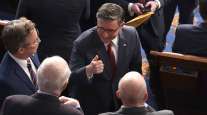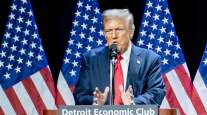Senior Reporter
President Trump Calls On Congress to Advance Sen. Barrasso’s Highway Bill

[Stay on top of transportation news: Get TTNews in your inbox.]
A State of the Union address that recounted the administration’s economic record and outlined a vision for achieving policies on immigration and health care also was a forum for President Donald Trump to briefly tell Congress to consider a highway policy bill not yet ready for prime time.
During an address delivered on the eve of the final day of his Senate impeachment trial, the focus of the president’s infrastructure messaging was a five-year highway reauthorization measure that left key questions about long-term funding unanswered.
“We must also rebuild America’s infrastructure,” Trump said Feb. 4 before asking the lawmakers to pass Sen. John Barrasso’s highway bill to “invest in new roads, bridges and tunnels all across our land.”

Barrasso
“I’m also committed to ensuring that every citizen can have access to high-speed internet, including and especially in rural America,” he added.
The reference to Barrasso’s highway policy measure was a departure from Trump’s passionate pledges to rebuild airports that he had said resembled structures from the “third world.” He also pointed to roadways in poor condition and bridges deemed structurally deficient. His hotel construction background and real estate bona fides culminated in him referring to himself as “Builder in Chief.”
This year, the Trump White House has not proposed an infrastructure package. Counselor to the president Kellyanne Conway told reporters Feb. 5, the day Trump was found not guilty on two articles of impeachment, the White House welcomes Democrats’ ideas on infrastructure. In 2018, the Trump White House had revealed a private sector-centric infrastructure plan. Concerns about the plan raised by members of Congress representing rural districts resulted in no cooperation with the White House. At that time, Republicans controlled the House and Senate.
Last year, Barrasso, a Wyoming Republican and chairman of the Environment and Public Works Committee, led the bipartisan passage of a measure meant to update the 2015 FAST Act highway law. While the Senate bill proposed $287 billion, a climate change plan and an aggressive streamlining of the environmental permitting process, it stopped short of addressing the Highway Trust Fund’s looming insolvency.
Other Senate committees have neither addressed the trust fund, nor transit and commercial transportation policies. Last month, House Democrats outlined a five-year, $760 billion infrastructure policy proposal they said was dependent on the president’s input on highway funding. The FAST Act expires in September.
In the Democrats’ formal response to the State of the Union, Michigan Gov. Gretchen Whitmer highlighted congressional Democrats’ recent big-picture infrastructure plan. She also noted legislatures in states such as Illinois and New Jersey, which opted to rehabilitate transportation corridors and multimodal facilities.
“All across the country, Democratic leaders are rebuilding bridges, fixing roads, expanding broadband and cleaning up drinking water. Everyone in this country benefits when we invest in infrastructure,” Whitmer said. She went on to take issue with Trump’s communication methodology. “Bullying people on Twitter doesn’t fix bridges. It burns them. Our energy should be used to solve problems.”
On Capitol Hill, chairman of the transportation panel in the House, Rep. Peter DeFazio (D-Ore.), described the president’s remarks about infrastructure as a missed opportunity.
In part one of a two-part exploration of autonomous technology today, our latest RoadSigns podcast revisits conversations with CEOs Alex Rodrigues of Embark and Cetin Mericli of Locomation. Hear them explain what testing automated trucks and developing platooning technology has taught them about the road ahead — and get new perspective with host commentary. Listen to a snippet from Rodrigues above, and to hear the full episode, go to RoadSigns.TTNews.com.
“President Trump barely mentioned the need to invest in our communities and help regular Americans by rebuilding our nation’s crumbling infrastructure,” DeFazio said. “That is incredibly disappointing, because the reality is that three years into his administration, President Trump has yet to put forth a single new idea that would fix our roads, bridges, ports, airports, water infrastructure and transit systems, or show any leadership on how our country funds significant infrastructure investment.”
Infrastructure funding proponents from diverse backgrounds continue to urge Congress and the president to advance comprehensive highway policy legislation, as well as a macroinfrastructure plan.
American Public Transportation Association CEO Paul Skoutelas said his group was appreciative of the reference to the highway bill in the State of the Union.
“Americans know that investing in our public transportation systems, highways and bridges will lead to benefits that repay the investment multiple times over in the coming decades,” Skoutelas said. “Increased investment in public transportation will get Americans to work, to education, and to health care, and it will also get our nation to more job creation, less traffic congestion and cleaner air.”
Brian McGuire, CEO of Associated Equipment Distributors, suggested lawmakers and the president use the negotiations that produced the new NAFTA deal as a guide for advancing a forward-looking infrastructure funding agenda.
“The time has come for both parties to stop kicking the can down the road and work together on real infrastructure funding options,” McGuire said. “The American people demand results, and it’s time for talk and promises to finally turn into action by providing the essential investments needed to return the United States’ infrastructure to the envy of the world while laying the groundwork for decades of economic growth and prosperity.”
The Highway Trust Fund is backed by insufficient revenue from the 24.4 cents-per-gallon diesel tax, and the 18.4 cents-per-gallon gas tax. The account assists states with maintenance and new projects. Its shortfall is projected for 2021.
Want more news? Listen to today's daily briefing:





